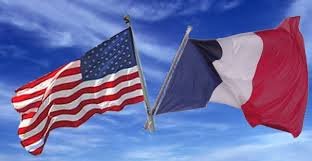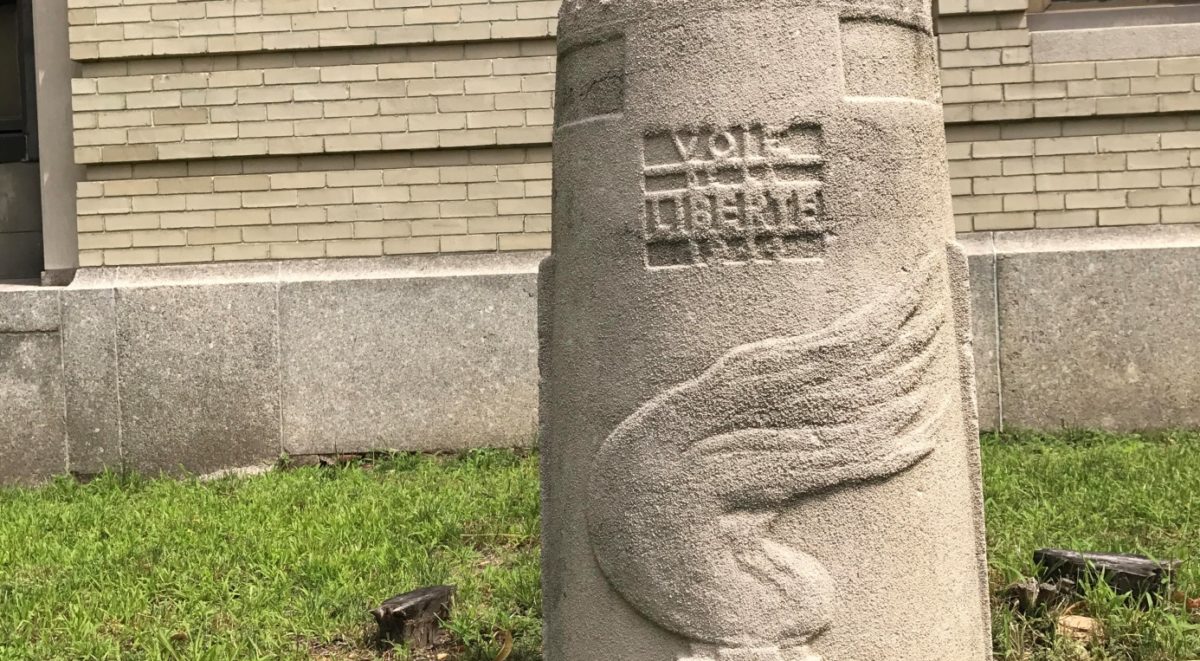
Mount Vernon Public Library, New York. View of the Liberty Road Marker, a permanent reminder to Mount Vernon residents of their ties with the French city of Thionville, was dedicated at the main entrance to the Library on South Second Street on Tuesday, May 24, 1949. E. J. Photo IMG 1345 © Evania Thompson. Mount Vernon, NY Public Library. All rights reserved.
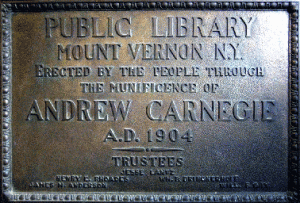
Public Library – Mount Vernon, NY. Erected By the People Through the Magnificence of Andrew Carnegie. A.D. 1904.
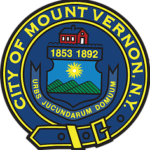
DEDICATION OF THIONVILLE MILESTONE TO TAKE PLACE AT LIBRARY ON MAY 24, 1949
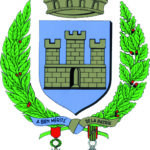
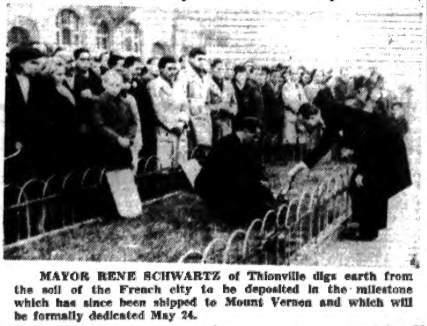
The Daily Argus, Mount Vernon N. Y., Saturday, May 14, 1949
OTD: May 24 , 1949 – May 24, 2019
Dear Citizens of Mount Vernon, New York,
Seventy years ago today… A deeply moving ceremony at the Mount Vernon New York Public Library, celebrating the arrival of the Thionville’s Liberty Road Marker was formally dedicated by Mount Vernon Mayor William H. HUSSEY.
This Memorial was a cement replica of the original 1,145 symbolic French milestones (bornes) marking each kilometer of the “La Voie de la Liberté” (Liberty Highway), the legendary route taken by General Patton’s Third Army after D-Day in Normandy (June 6, 1944) stretching from Sainte-Mère Église, Normandy, to Bastogne, Belgium via Metz and Luxembourg.
The idea of donating this “borne,” one of the most symbolic “Merci Train” gifts sent by the People of Thionville as a token of appreciation to Mount Vernon for its contributions to their war-stricken population via the New York State boxcar (the 40 & 8 Voiture #92 housed in Whitesboro, New York), one of the iconic 49 SNCF 40 & 8 boxcars arriving in New York City aboard the French cargo S.S/ Magellan on February 2, 1949, came from Col. Guy de LA VASSELAIS, father of the “Voie de la Liberté” (Liberty Highway) and Executive Vice-president of the French Gratitude Train Committee.
Col. Guy de LA VASSELAIS, who was French liaison officer to Gen. PATTON’s 3rd Army during the War, and had spent a month (Spring 1946) in the United States, along with his friend Gabriel HOCQUART, Mayor of Metz, as guest of honor of Gen. Walton H. WALKER, liberator of THIONVILLE (Nov. 15, 1944), had indeed convinced the Mayors of some of the most war-damaged French towns and cities along Liberty Highway to send this historical Memorial, each filled with soil from local battlefield, to their generous donors in America.
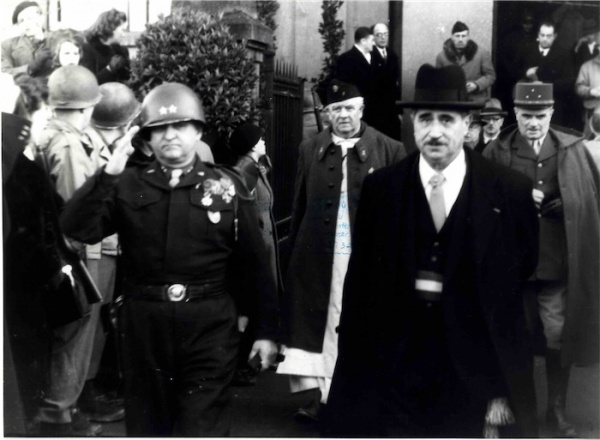
On December 16, 1944, Henri Léonard, mayor of Thionville, welcomed its liberator, Gen. Walton H. Walker, commanding general of XX Corps, who first led his troops into combat in Normandy in June 1944 as part of Patton’s Third Army. © Thionville Municipal Archives.
Among those who attended and spoke at the official presentation of the Thionville milestone to the people of Mount Vernon, complete with a color guard formed by members of Boy Scout and Girl Scout Troops, and the school band playing the national anthems before the speeches, were: Mayor William H. HUSSEY; Miss Yvonne PÉTREMENT, vice-consul of the French Republic; Miss Veronica PAGANUZZI, a graduate of Washington and Davis High School, who sang “La Marseillaise;” Mrs. Edward STASHEFF, chairman of the Board of Library Trustees; Dr. Howard SPALDING, principal of Davis High School, who presided the ceremonies; Mrs. Henry D. PARAMOURE, Mount Vernon-Thionville committee secretary, and Mrs. Charles TIDBALL, executive member of the said committee.
As one of the most important figures in the heroic French RESISTANCE, Miss PÉTREMENT, who had fled occupied France to join Gen. DE GAULLE’s Free French Forces in London in 1943, explained how the milestone containing earth from Thionville, was dug up by Mayor René SCHWARTZ on Nov. 11, 1948, the official anniversary of the liberation of his city.
Calling the marker “an overlasting token of American sacrifice, of the blood shed for France’s liberation, and of the great price for a free world in which we have chosen to live.” Miss PÉTREMENT closed by thanking the Mayor and the Mount Vernon-Thionville Town Adoption Committee for the work achieved.
Mayor HUSSEY coudn’t agree more. “These exchanges between the people of Thionville and Mount Vernon indicate an everstrengthening bond of unity. We are working together to win the war,” he declared.
“May the cooperation between our countries continue and may we expend the same great energies for peace that we found necessary to win the war,” Mayor HUSSEY concluded.
After the Mayor and the vice-consul had spoken, Mrs. Edward STASHEFF, expressing the library’s feeling of being honored, said how she “hoped the milestone in every truth would be a milestone along the road of better relationship. She added, “it may serve as a reminder not only of friendship but of the long struggle for freedom and how precious that is.”
The program concluded with another selection by the Washington School band, playing under the direction of Robert EVANS, music teacher.
After the dedication, addresses were recorded in the library Community Room via WRUL, shortwave radio station of the Worldwide Broadcasting Foundation of New York and Boston, which would be rebroadcasted on French radio stations about June 8.
So how did the Mount Vernon-Thionville sister city relationship actually started?
Well, as most extraordinary stories related to the “Merci Train,” Mount Vernon’s historical relationship with Thionville, one of the most war-damaged French towns in the northeastern department of Moselle, near the German border, in Alsace-Lorraine, began with the first Friendship Train — the $40,000,000 food relief campaign, prelude to the Marshall Plan, conceived in October 1947 and launched nationwide by Washington D.C. columnist Drew PEARSON to help feed the starving children and the elderly overseas — the most vulnerable people of France and Italy, already bracing for the deadly Winter of 1947-1948.
Yet, up to now, this important chapter in Mount Vernon’s rich history was mostly forgotten. Up to now, on both sides of the Atlantic, no one really knew about the great humanitarian role Mount Vernon’s residents — your parents and grandparents — played in post-WWII Europe.
So, before I tell you more about the inspiring story forever attached to your City and Public Library, also related to Mount Vernon’s most famous native son, Denzel WASHINGTON…
I’m thrilled to inform you that for the past two and a half years — as part of our official French-American-Italian project #MDFDEFriendshipMerciTrain70 celebrating the 70th Anniversary of the Merci Train in 2019; and project #MDFDEFriendshipMerciTrain75 celebrating the 75th Anniversary of both the Friendship Train and the Liberty Road in 2022 — Ms. Evania A. THOMPSON, Director of Mount Vernon Public Library, Ms. Leslie ALPERT, Ms. Brigitte HELZER, Executive Director MDFDE/New England, and I have been working closely together on rekindling your city’s historical ties with the City of Thionville, France.
Here is how, 70 years ago, Mount Vernon, N.Y. rose to Thionville’s challenge in the name of Humanity…
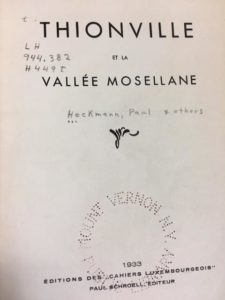
One of the “Merci Train” gifts sent by Thionville to Mount Vernon, N.Y. in 1949. Photo © Leslie Alpert, Mount Vernon, NY Public Library. All rights reserved.
Washington D.C., October 11, 1947: As Republican Congress was still debating about how much the United States should invest in helping her Western Allies recover from the war… Defying columnist Drew PEARSON, calling for immediate public action, launched the Friendship Train, a people-to-people movement promoting peace and mutual understanding between nations by donating food for starving France and Italy.
Los Angeles, Calif. Nov. 7, 1947: Following a star-studded Hollywood Parade, no sooner did the Friendship Train, chaired by movie mogul Harry M. WARNER, left Glendale train station on its transcontinental journey to New York… Fired up by Pearson’s call of duty to rescue France and Italy, towns and cities lost no time in following up California’s lead.
In Mount Vernon, Mayor HUSSEY, who proclaimed Wednesday, November 19, 1947, “Friendship Train Day,” and had turned the conference room in City Hall into the official food “depot,” every school, church, business, civic and youth group, and institution on board — including the Community Church of The Pelhams, Mount Vernon Board of Trade, Mount Vernon Kiwanis, all Catholic churches in the Archdiocese, Mount Vernon Rotary, Mount Vernon Lions Club, the Junior Red Cross, the Competitive Civil Service Employes Association, Business and Professional Women’s Clubs (BPW), Lincoln High and Pennington Elementary School, Boys Scout and Girl Scout Troops — contributed much food taken to New York for shipping.
Locust Valley, New York, Dec. 11, 1947: Four days after the S.S. cargo American Leader aka “Friend Ship,” carrying the first shipment of the Friendship Train for France, left New York for Le Havre… Like many communities nationwide, more inspired than ever to set up other Friendship Trains possibly before the year was over… Back in New England, Oyster Bay Town’s hamlet of Locust Valley was just getting ready to make History…
It Takes a Village: Operation DEMOCRACY
As the wealthiest Long Island suburb, the community of Locust Valley in Nassau County, New York, whose 5.000 inhabitants were among the richest per capita in the U. S., must have felt they carried even more responsabilities than others when launching their own movement, the brilliant “Adopt-a-City” Plan, urging American cities and towns to do the same in aiding devastated European communities as a supplement to the Marshall Plan.
Called “Operation Democracy,” as a result Locust Valley adopted the town of Ste. Mère-Église in Normandy, the first village liberated by the 82nd Airborne and Allied troops after D-Day landings, and burial place of thousands of American soldiers, including Brigadier General Theodore Roosevelt, Jr., from Oyster Bay, New York, the eldest son of Theodore “Teddy” Roosevelt, Jr., 26th President of the United States.
What happened next was pure American goodness! In a scenario similar to Drew PEARSON’s spectacular results with the Friendship Train… Locust Valley’s own “Operation Democracy” meant so much more to U. S. citizens than any government plan that, within a year, nearly 200 American cities — including Mount Vernon, New York (see more info. below) — followed its lead by adopting sister cities all over the world.
In 1956, President Dwight EISENHOWER, truly inspired by the success of the Friendship Train (for which he had awarded the title of “Father of the Year” to Drew PEARSON in 1948), the “Merci Train,” and now the beautiful relationship between Locust Valley, N. Y. and Sainte-Mère Église, would create the federal program called “Sister Cities International,” Locust Valley’s living legacy counting today more than 700 “twinned” cities worldwide.
Paris, France, Dec. 20, 1947: By the time the first shipment of the Friendship Food Train arrived to great fanfare at the Gare Saint-Lazare in Paris, you would think the people of Mount Vernon, proud of how much good deed they had just done with the Friendship Train, were now just planning their own Christmas and New Year holidays, right? Not a chance!
December 26, 1947: No sooner was Christmas over… Now officially on board with the city of New Rochelle, Mount Vernon’s next door neighbor, ready to launch its own New Rochelle Friendship Train carried by all Westchester communities, the New England campaign would successfully collect food, clothing and other necessities for famine-stricken areas of France, Italy and Scotland in Connecticut, Rhode Island, finishing its run in Boston, Massachusetts.
The “Merci Train,” a token of gratitude to the People of the United States
Paris, November 15, 1948: As SNCF employees kept going night and day, sorting through thousands of “Merci Train” gifts piled up at the Gare d’Orsay before being shipped to New York… Thionville residents, who had already sent their presents with the Liberty Road marker to Paris, got the magnificent news: Thanks to “Operation Democracy,” their town had just been adopted by Mount Vernon, New York.
Three months later…
Weehawken, New Jersey, February 3, 1949: As Broadway was celebrating the arrival of the “Merci Train” with a huge Parade; and the S.S. Magellan’s precious cargo, docked in New Jersey, was being carefully unloaded unto rail cars before being distributed to the state capitals…
Back in Mount Vernon, N.Y., the newly created Mount Vernon-Thionville Town Adoption Committee was working hard. Following their January appeal to the population, asking for cash contributions to purchase food and clothing for Thionville’s neediest, the response had been so encouraging that by the time the S.S. Magellan sailed back to Le Havre on Feb. 5 — making sure it was not going home “empty handed” — Mount Vernon’s initial shipment of 200 lbs of powdered milk and clothing collected in record time for their sister city, Thionville, was on its way…
Mount Vernon, the city that kept on giving February, March, April 1949… Mount Vernon, now using the YMCA as depot, never stopped thinking about Thionville, sending more food including cereal, sugar and cocoa as well as much needed warm clothing, shoes, blankets, linen and books for the Thionville Library. So much so that by September 1949 the Mount Vernon-Thionville Committee and Mount Vernon Public Library, always thinking ahead, were now selling illustrated “Thionville themed” Christmas cards, using the funds raised through the card sale to buy more books and school supplies, provide further aid to Thionville’s neediest citizens while fostering goodwill ties between our sister cities.
As our projects with your City and Thionville continue… please stay tuned dear Mount Vernon citizens as we now explore the significant impact the Mount Vernon Public Library, along with the Boys & Girls Club of Mount Vernon, also had on the remarkable life of your most famous humanitarian son, the multi-talented actor-director-producer Denzel WASHINGTON. So, “à bientôt!”
With my kindest regards to you all,
Elisabeth Jenssen

The “Train de la Reconnaissance Française” aka “Merci Train” (1949).
#GRATITUDE
#RESISTANCE
#FREEDOMOFTHEPRESS
#MDFDEFriendshipMerciTrain70
© The Official French-American Project entirely conceived by Ms. Elisabeth JENSSEN to celebrate the 70th Anniversary of the Merci Train (2019-2020) and the 75th Anniversary of the Friendship Train (2022). All rights reserved.
Chair, Elisabeth Jenssen
Honorary President: The Comte Gilbert de Pusy La Fayette
Contact: elisabeth.jenssen@francaisdeletranger.org
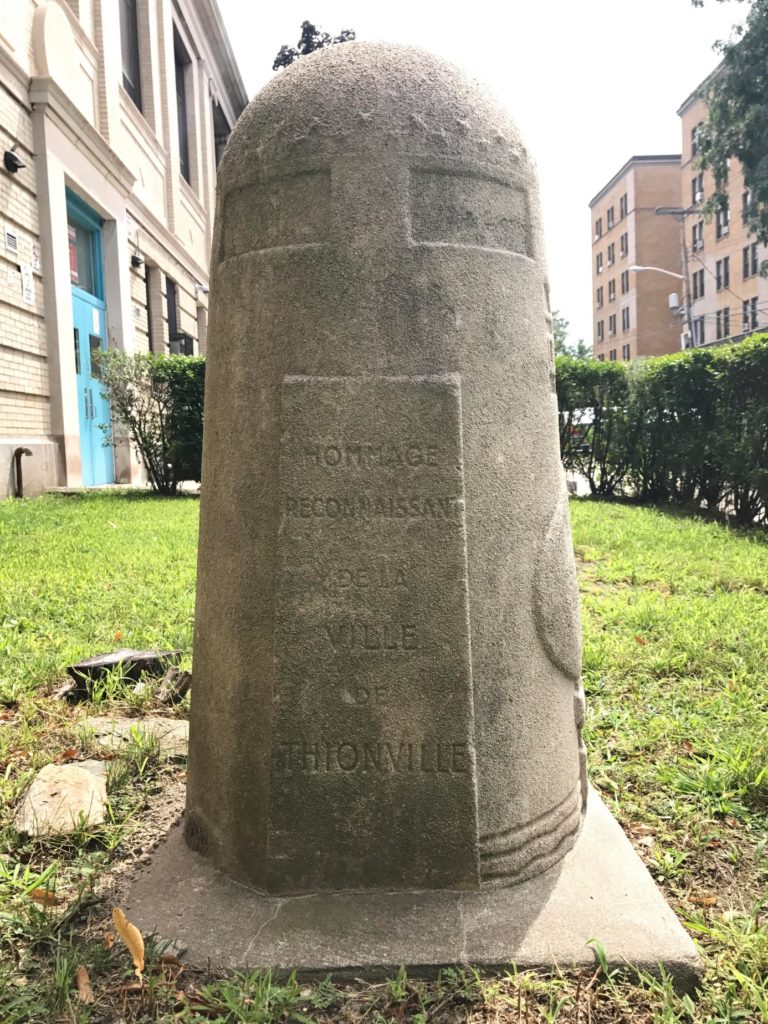
Photo IMG 1343 © Evania Thompson. Mount Vernon, NY Public Library. All rights reserved.
Related Links and Posts: http://mountvernonpubliclibrary.org/
